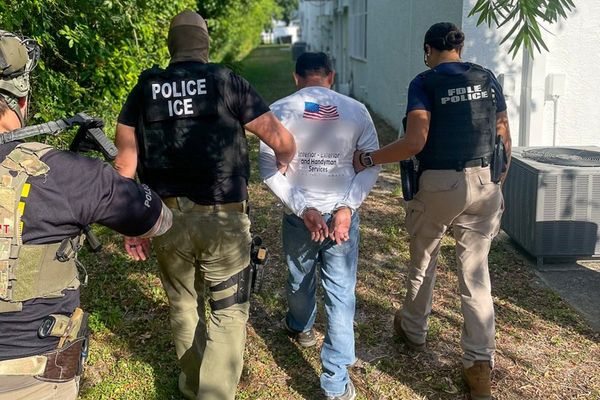
Many dictators try to cover up their children’s crimes. For Ramzan Kadyrov, the Chechen warlord, broadcasting his son’s violent behaviour may be a strategy for holding on to power.
In September, Kadyrov reposted a video on the Telegram social network showing Adam, his then 15-year-old son, launching a flurry of kicks and punches to the head of a Russian prisoner who had been transferred to Chechnya after being accused of burning a Qur’an.
Kadyrov, a self-styled defender of the Islamic faith, said he could not have been prouder of his favourite son. “What is there to punish him for?” said Kadyrov, when asked about the video at an end of year press conference. “It would have been good if he had killed him.”

The video was the latest example of the special brand of lawlessness and violence encouraged by Chechnya’s leader since 2007. The region has seen allegations of intimidation and torture of political opponents and a pogrom against the LGBT community in just the past few years.
But it also came in a campaign of awards and senior positions for his children that observers say is meant to ward off challengers to his power in Chechnya, distracting attention from reports of his ill health and indicating that a generation of new leaders is being groomed to, at some point, replace the 47-year-old Kadyrov.
As the video surfaced, a bevy of awards were delivered to his children to elevate their status: Adam, at 15 years old, was appointed the head of his father’s security detail, a position that Kadyrov himself held in his late father’s administration.
Adam also received a “hero of the Chechen Republic” award, as well as accolades from other mostly Muslim republics, including Tatarstan and several North Caucasus regions.
“[Kadyrov] is trying to give his children a boost at the start of their political careers, to prepare them,” said Abubakar Yangulbayev, an opposition activist in exile. “It’s an investment in the future, even if [the positions] look ridiculous right now.”
Kadyrov’s other children were also given high state awards and two were even included in Russia’s delegation to the Cop28 climate conference in Dubai.
“I think that against the backdrop of the persistent rumours about his ill health, Mr Kadyrov is trying to show that he has a really strong family behind him, including potential successors,” said Tanya Lokshina, the Europe and central Asia associate director at Human Rights Watch. “And that even if something happens to him, then there are others that would be able to take his place – pick up the mantle.”
Kadyrov has ended the year apparently firmly in power in Chechnya, accompanying Vladimir Putin to meetings with Sheikh Mohammed bin Zayed Al Nahyan of the United Arab Emirates and Mohammed bin Salman of Saudi Arabia.
But earlier this year, rumours were widespread that he was suffering from persistent kidney problems and was receiving treatment at an elite Moscow clinic, where gatherings of the Chechen elite had raised speculation that Kadyrov could be on his deathbed.
Kadyrov finally resurfaced in a video at the clinic, where he claimed it was his uncle who was sick and denied rumours of his own ill health.
“Thank God, I am alive and well. I do not understand at all why, even if I were ill, there should be such a fuss?” he said.

But even after he reappeared, rumours of an illness have persisted – as have questions of how a successor could be chosen if he were to die.
Observers broadly believe that Kadyrov has been battling health problems, but believe these efforts to strengthen his family do not suggest Kadyrov is set to leave power imminently.
“That he’s having health problems is clear,” said Ruslan Kutaev, a Chechen activist jailed under Kadyrov and who later went into exile. But he added that the awards and positions did not suggest Kadyrov was about to leave power immediately.
Ben Noble, an associate professor in Russian politics at University College London, said: “I think we can say with some confidence that Ramzan Kadyrov is trying to bolster the position of his family, but we know little beyond that, including what’s driving this effort – there’s a black box and we should be willing to admit the limits to our knowledge.”
But the efforts could also be a strategy to strengthen Kadyrov’s reign. Kutaev argued that the Kremlin is interested in managing any potential conflict that could emerge in a succession, pointing in particular to the powerful clans around Kadyrov: those of Magomed Daudov, the chair of the Chechen parliament, who is known as “Lord”, state Duma member Adam Delimkhanov and that of Abuzayed Vismuradov, often called “Patriot”, another local functionary, with access to Kadyrov.
“It was a signal to those surrounding Kadyrov: none of you under any circumstances will be put in charge of the Chechen Republic,” said Kutaev. “And that’s when Kadyrov’s children suddenly became necessary, received awards, were put in high positions. It said: in the future, one of Kadyrov’s children will run the republic.”
The favourite appears to be his son Adam, a chubby teenager who is best known in Russia for winning staged mixed martial arts (MMA) fights from the age of eight. Yet he remains far too young to make a serious attempt for control of Chechnya, observers said, and has no business in senior state positions.
“We see that Kadyrov orchestrated a martial arts career for him and he was shown on numerous occasions winning MMA fights, which again must have been completely fictitious because he was against adult fighters,” noted Lokshina. “To me, the way that [Adam] is being brought up is simply outrageous – it’s a young boy who is brought up in violence and lawlessness and who is then praised for engaging in violence and lawlessness.”
Kadyrov has tested the limits of extending that lawlessness beyond the borders of Chechnya, hunting down opponents and critics elsewhere in Russia and abroad.
In one egregious case, Kadyrov’s law enforcement kidnapped Zarema Musayeva, the mother of several well-known Chechen dissidents, from her flat in the Russian city of Nizhny Novgorod, far from Chechnya, and then brought her back to the republic, where she was sentenced to five and a half years in prison. Her application for parole was rejected earlier this month.
“Inside Chechnya, Kadyrov can do whatever he wants,” said the opposition activist Yangulbayev, one of Musayeva’s sons. “But [in the kidnapping], he began to test his limits and to undertake these forbidden steps. Now the case is being used to scare other people and that’s why she is being kept in prison… They say: ‘Shut your mouth, because it’s not you who’s going to suffer, but your mother.’”
Russian investigative journalist Elena Milashina and a human rights lawyer were severely beaten in Grozny, the Chechen capital, on the day of Musayeva’s sentencing.
Delimkhanov, the Kadyrov ally, had also threatened to kill Musayeva’s entire family, and their relatives have been sent to the war in Ukraine.
“People feel this in Chechnya,” said Yangulbayev. “This fear is constant.”







